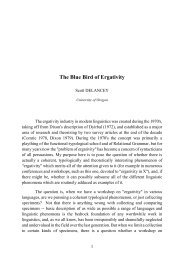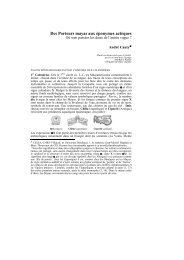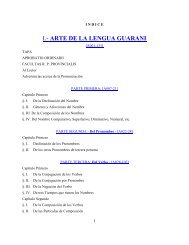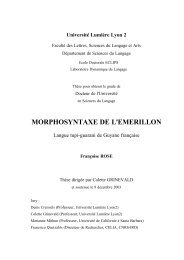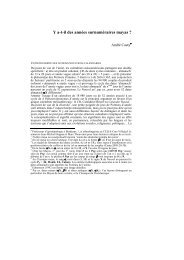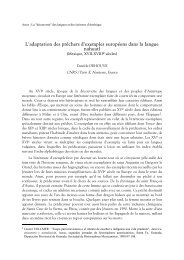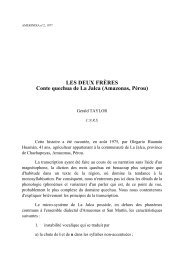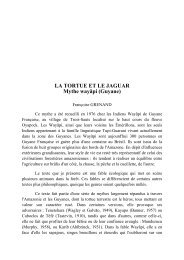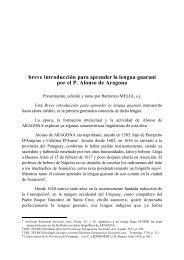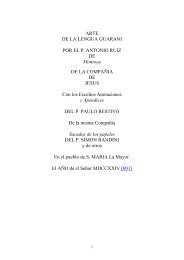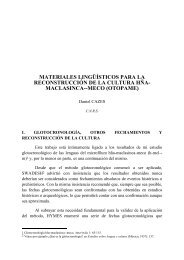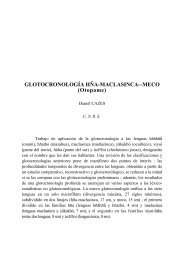Kanawa ailë nïtëm Il est parti en canot - celia
Kanawa ailë nïtëm Il est parti en canot - celia
Kanawa ailë nïtëm Il est parti en canot - celia
Create successful ePaper yourself
Turn your PDF publications into a flip-book with our unique Google optimized e-Paper software.
OSI EPIT n. arbre (Vismia spp. , Clusiacées ) :<br />
Tïpikai osi epit L’écorce de osi epit <strong>est</strong><br />
coupée.<br />
OSIMË n. gerçure.<br />
OTALÏ n. secret.<br />
OTAU n. cache, cachette : Otau lëk<strong>en</strong> tïhem<br />
tënehemmela (Autrefois,) il fabriquait (le<br />
maluwana) <strong>en</strong> cachette et personne ne le<br />
regardait.<br />
OTÏ n. (poss.) 1. alim<strong>en</strong>t, nourriture : Totïke wai<br />
J’ai de la nourriture ; Jot aklamak ïja Garde de<br />
quoi manger pour moi.<br />
2. proie : Kunkane lopa : totï j<strong>en</strong>etpo <strong>Il</strong> a<br />
redit : J’ai vu mon alim<strong>en</strong>t ; Jotï tohto tuer la<br />
proie ; Ëwotï ma tuwëta Vas chasser ta<br />
proie ! Totï kom tuwëi <strong>Il</strong> chassait pour se<br />
nourrir (litt. <strong>Il</strong> chassait son propre alim<strong>en</strong>t) ;<br />
Jotïpsik <strong>en</strong>epkë Apporte quelque chose à<br />
manger, s’il te plaît ! Ïpï motakanakë jotï<br />
tohto kane, kunkane lopa Dans la vallée de<br />
la montagne, je tue ma proie, disait-il<br />
(kalawu).<br />
3. repas : Otï ëlahnë Le repas n’<strong>est</strong> pas<br />
<strong>en</strong>core prêt.<br />
KA OTÏ Alim<strong>en</strong>t pour poissons.<br />
KAIKUI OTÏ Alim<strong>en</strong>t pour chi<strong>en</strong>.<br />
TOLOPÏT OTÏ Alim<strong>en</strong>t pour oiseau.<br />
TOTÏME Se nourrir : Kaikui [istaino] kapawu<br />
uhmoja totïme Le jaguar tue la biche pour<br />
se nourrir.<br />
OTÏTPÏ n. nourriture vieille.<br />
KAIKUI OTÏPË Alim<strong>en</strong>t du chi<strong>en</strong>.<br />
ËKËI OTÏTPË Morsure de serp<strong>en</strong>t (Litt.<br />
serp<strong>en</strong>t/alim<strong>en</strong>t.PART)<br />
OTO n. voiture (empr. fr). Cf. kahu.<br />
OTO KATOP MALIJA n. bistouri.<br />
OTOMAN n. habitation rectangulaire de toit oval :<br />
Pakolo otoman. (Br.)<br />
OTOPAN n. habitation rectangulaire dont les<br />
deux extrémités du toit sont arrondies :<br />
Pakolo otopan.<br />
OTOPET n. 1. maison dont les parois étai<strong>en</strong>t<br />
tressées fermem<strong>en</strong>t afin de se protéger des<br />
<strong>en</strong>nemis.<br />
2. natte pour dormir (à l’époque où les<br />
Wayana n’utilisai<strong>en</strong>t pas <strong>en</strong>core le hamac).<br />
•Cette natte <strong>est</strong> toujours confectionnée pour<br />
ramasser les détritus.<br />
OTOSITPË n. foudre.<br />
48<br />
a e ë i ï o u h j k l m n p s t w<br />
OWAU n. coracine chauve (Perissocephalus<br />
tricolor, Passeriformes, Cotingidé).<br />
OWOLI, OWOLILUWA n. oiseau, trogon à queue<br />
blanche (Trogon viridis, Trogoniformes,<br />
Trogonidé) : Ësewulëkëma owoli luwa<br />
Continuez à circulez, l’oiseau owoli !<br />
OPKA (topkai) v. 1. remplir le recipi<strong>en</strong>t à boire.<br />
2. jouir : Opkapëk wai Je jouis ; Kuwopkei<br />
Je te fais jouir.<br />
OTKALAN n. côte : Otkalan etumhak <strong>Il</strong> a mal à la<br />
côte.<br />
U<br />
-U{LU} (tuhe) v. conseiller, expliquer : Ujai Je le<br />
conseille ; Mujai Tu le conseilles ; Imjata<br />
nuja <strong>Il</strong> donne des conseils au jeune garçon ;<br />
Kokone ulu jemsi Hier, j’ai conseillé ma<br />
fille ;Mamak julu Ma mère m’a conseillé ;<br />
Une ïpeinom J’ai conseillé mes <strong>en</strong>fants ;<br />
Nulu <strong>Il</strong> l’a conseillé ; Tïtuwalonumai tëpijem<br />
tuhe C’<strong>est</strong> pour expliquer la tradition aux<br />
initiés (kalawu) ; Uhehepkë tëlë Parles-<strong>en</strong><br />
immédiatem<strong>en</strong>t à la famille.<br />
UTOP Explication.<br />
UHMÏ n. bandeau pour les cheveux.<br />
UHMO (tuhmoi) v. 1. frapper, attaquer : Wëlïi<br />
tuhmoi hela il ne doit pas frapper une<br />
femme ; Ëwuhmoja nai mëkja <strong>Il</strong> t’attaque<br />
2. assommer : Eluwa ololi uhmo L’homme a<br />
assommé l’iguane; Tuhmoi weweke <strong>Il</strong><br />
frappe avec un bâton.<br />
3. tuer (à la chasse) : Kaikui [istaino]<br />
kapawu uhmo Le jaguar a tué la biche ;<br />
Uhmok Tue-le ! Eluwa ololi uhmo L’homme<br />
a tué un iguane ; Ïjum ololi uhmoi nïtem<br />
Hier, mon père <strong>est</strong> allé à la chasse à<br />
l’iguane.<br />
-UHMO-UHMO (tuhmo-tuhmoi) v. battre : Mule<br />
uhmo-uhmoja <strong>Il</strong> frappe fort l’<strong>en</strong>fant ; Wëlïi<br />
tuhmo-tuhmoi La femme <strong>est</strong> battue.<br />
2. frapper à mort.<br />
UHMONE n. (arch.) guerrier : Wajana uhmone<br />
Guerrier wayana. Cf. uhmotën.<br />
-UHMOPO (tuhmopoi) v. faire tuer : Tuhmopoi he<br />
man <strong>Il</strong> faut le (faire) tuer.<br />
UHMOTËN n. (arch.) guerrier, tueur. Cf.<br />
uhmone.



